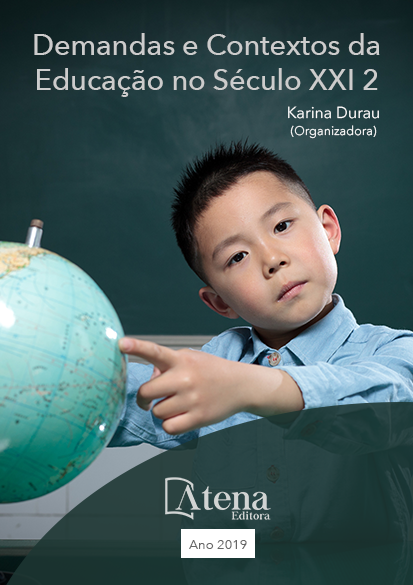
A CONTRIBUIÇÃO DO ORIENTADOR EDUCACIONAL NAS RELAÇÕES INTERPESSOAIS
O presente trabalho, toma-se como
objeto de estudo a contribuição do Orientador
Educacional nas relações interpessoais entre
o corpo docente, discente e famílias. Com
objetivo de analisar a importância da presença
do Orientador Educacional nas escolas do
grupo SEB - sistema Educacional Brasileiro na
Bahia, cujo projeto foi submetido e aprovado
pelo Comitê de Ética em Pesquisa. Realizouse a pesquisa em quatro escolas da Bahia, três
no município de Salvador e uma no município
de Lauro de Freitas. Optou-se pela abordagem
qualitativa exploratória. Assim, foi realizada
entrevista semiestruturada como dispositivos de
investigação. A partir da questão básica acerca do
que pensa o corpo docente, discente e família a
respeito do trabalho do Orientador Educacional?
Para tanto, buscou-se como marco teórico
as contribuições de Grinspun (1994/2010);
Carvalho, (1979/2010); Giacáglia e Penteado
(2010); Morin (2011), com informações atuais
e de extrema relevância à temática estudada,
proporcionando o enriquecimento da pesquisa
com fundamentação científica. Os resultados
apontaram que o trabalho da Orientação
Educacional no contexto das distintas unidades
da escola particular investigada, caracterizouse por uma dimensão pedagógica muito mais
abrangente, tendo suas funções demarcadas
e valorizadas. Este profissional possui um
caráter mediador junto aos demais educadores,
atuando em conjunto com todos os atores da
escola para facilitar as relações interpessoais,
no resgate de uma ação mais efetiva e reflexiva,
visando qualificar a educação nas unidades
escolares, tornando-as indivíduos conscientes,
reflexivos e respeitosos com as diferenças e
coletividade.
A CONTRIBUIÇÃO DO ORIENTADOR EDUCACIONAL NAS RELAÇÕES INTERPESSOAIS
-
DOI: 10.22533/at.ed.83419040224
-
Palavras-chave: Orientador Educacional. Família. Escola
-
Keywords: Educational Advisor. Family. School
-
Abstract:
The present study takes as object
of study the contribution of the Educational
Advisor in the interpersonal relations between
the faculty, students and families. In order to
analyze the importance of the presence of the
Educational Advisor in the schools of the SEB
group - Brazilian Educational System in Bahia,
whose project was submitted and approved by
the Research Ethics Committee. The research
was carried out in four schools in Bahia, three
in the municipality of Salvador and one in the
municipality of Lauro de Freitas. We opted for
the exploratory qualitative approach. Thus, a
semi-structured interview was conducted as
research devices. From the basic question
about what the faculty, student and family think about the work of the Educational
Advisor? The author de Grinspun (1994/2010); Carvalho, (1979/2010); Giacáglia e
Penteado (2010); Morin (2011) with current information and the results showed that
the work of Educational Guidance in the context of the different units of the private
school investigated, was characterized by a pedagogical dimension much more
comprehensive, having its functions demarcated and valued.This professional has a
mediating role with other educators, acting together with all the actors of the school to
facilitate interpersonal relations, in the rescue of a more effective and reflexive action,
aiming to qualify education in school units, the conscious, reflective and respectful
individuals with the differences and collectivity.
-
Número de páginas: 15
- Edla Maria Gordiano Chagas


